Laravel developers are the backbone of modern web applications, responsible for building robust and scalable backend systems. They work with the Laravel framework to create efficient and maintainable code, ensuring that applications run smoothly and can handle growth.
Skills required for a Laravel developer include proficiency in PHP, understanding of MVC architecture, and experience with databases like MySQL. Additionally, they need to be adept at problem-solving and have good communication skills to collaborate effectively with other team members.
Candidates can write these abilities in their resumes, but you can’t verify them without on-the-job Laravel Developer skill tests.
In this post, we will explore 9 essential Laravel Developer skills, 10 secondary skills and how to assess them so you can make informed hiring decisions.
Table of contents
9 fundamental Laravel Developer skills and traits
The best skills for Laravel Developers include PHP Proficiency, MVC Architecture, Database Management, RESTful APIs, Blade Templating, Routing, Authentication & Authorization, Testing and Composer.
Let’s dive into the details by examining the 9 essential skills of a Laravel Developer.
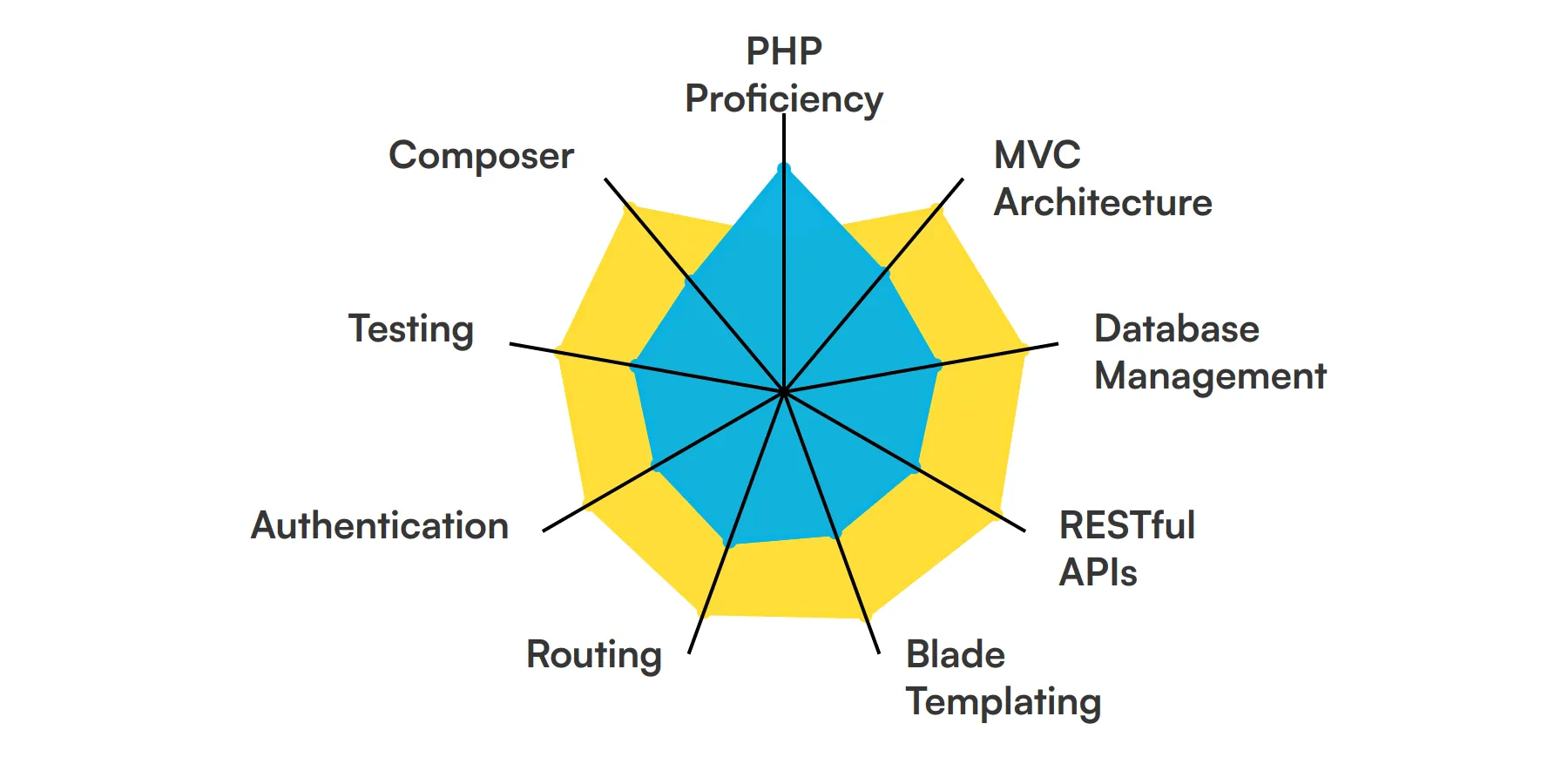
PHP Proficiency
A Laravel developer must have a strong grasp of PHP, as Laravel is a PHP framework. This skill is crucial for writing clean, efficient, and maintainable code. PHP proficiency allows the developer to leverage Laravel's features effectively.
For more insights, check out our guide to writing a PHP developer Job Description.
MVC Architecture
Understanding the Model-View-Controller (MVC) architecture is fundamental for a Laravel developer. This design pattern helps in organizing code logically, making it easier to manage and scale applications. It separates the application logic from the user interface, promoting better code maintenance.
Database Management
A Laravel developer should be adept at managing databases, including MySQL, PostgreSQL, or SQLite. This skill involves designing database schemas, writing efficient queries, and using Laravel's Eloquent ORM for database interactions.
RESTful APIs
Creating and consuming RESTful APIs is a key skill for a Laravel developer. This involves designing endpoints, handling requests and responses, and ensuring secure and efficient data exchange between the client and server.
Check out our guide for a comprehensive list of interview questions.
Blade Templating
Blade is Laravel's powerful templating engine. A developer should be proficient in using Blade to create dynamic, reusable views. This skill helps in building user interfaces that are both efficient and easy to maintain.
Routing
Routing is a core aspect of Laravel development. A developer needs to define routes that map URLs to specific controllers and actions. This skill ensures that the application can handle user requests correctly and efficiently.
For more insights, check out our guide to writing a Laravel developer Job Description.
Authentication & Authorization
Implementing authentication and authorization is crucial for securing Laravel applications. A developer must be skilled in using Laravel's built-in authentication system to manage user access and protect sensitive data.
Testing
Writing tests is essential for ensuring the reliability of a Laravel application. A developer should be familiar with PHPUnit and Laravel's testing tools to create unit tests, feature tests, and integration tests.
Check out our guide for a comprehensive list of interview questions.
Composer
Composer is a dependency management tool for PHP. A Laravel developer should know how to use Composer to manage project dependencies, ensuring that the application has all the necessary libraries and packages.
10 secondary Laravel Developer skills and traits
The best skills for Laravel Developers include JavaScript, Version Control, CSS & HTML, Command Line Interface, Package Development, Server Management, API Documentation, Caching, Queue Management and Security Best Practices.
Let’s dive into the details by examining the 10 secondary skills of a Laravel Developer.
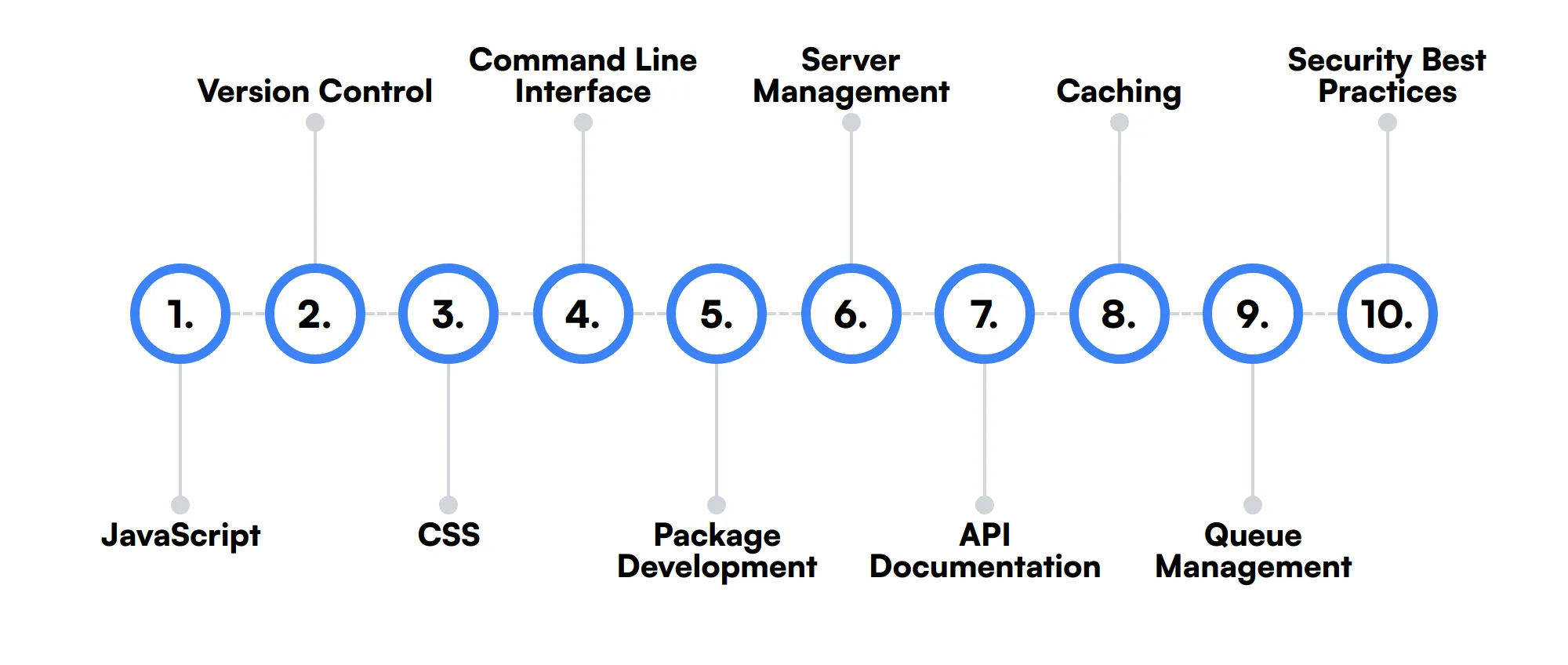
JavaScript
While not the primary focus, a Laravel developer should have a basic understanding of JavaScript. This skill is useful for adding interactivity to web applications and working with front-end frameworks like Vue.js or React.
Version Control
Knowledge of version control systems like Git is important for a Laravel developer. This skill helps in tracking changes, collaborating with team members, and managing different versions of the codebase.
CSS & HTML
A good grasp of CSS and HTML is necessary for a Laravel developer to create well-structured and styled web pages. This skill complements Blade templating and helps in building responsive and visually appealing interfaces.
Command Line Interface
Familiarity with the command line interface (CLI) is beneficial for a Laravel developer. Many Laravel tasks, such as running migrations and seeding databases, are performed via the CLI.
Package Development
Creating and managing custom packages can extend the functionality of a Laravel application. A developer with this skill can build reusable components that can be shared across multiple projects.
Server Management
Basic server management skills are useful for a Laravel developer. This includes deploying applications, managing server configurations, and ensuring the application runs smoothly in a production environment.
API Documentation
Documenting APIs is important for maintaining clear communication with other developers and stakeholders. A Laravel developer should be able to create comprehensive API documentation using tools like Swagger.
Caching
Implementing caching strategies can significantly improve the performance of a Laravel application. A developer should know how to use Laravel's caching mechanisms to store and retrieve data efficiently.
Queue Management
Handling background tasks using queues is a valuable skill for a Laravel developer. This involves setting up and managing queues to process tasks asynchronously, improving the application's responsiveness.
Security Best Practices
A Laravel developer should be aware of security best practices to protect the application from common vulnerabilities. This includes understanding CSRF, XSS, SQL injection, and other security threats.
How to assess Laravel Developer skills and traits
Assessing the skills and traits of a Laravel developer can be a nuanced process. It's not just about knowing PHP or understanding MVC architecture; it's about how well they can integrate these skills to build robust applications. To ensure you find the right fit for your team, you need to look beyond resumes and certifications.
Skills-based hiring practices, such as talent assessments, provide a more accurate picture of a candidate's capabilities. For instance, Adaface on-the-job skill tests can help you achieve a 2x improved quality of hires by focusing on real-world scenarios. This approach allows you to evaluate their proficiency in key areas like database management, RESTful APIs, and Blade templating.
By leveraging these assessments, you can also significantly reduce your screening time by 85%. This means you can quickly identify candidates who excel in routing, authentication & authorization, testing, and using Composer, ensuring that you bring the best talent on board efficiently.
Let’s look at how to assess Laravel Developer skills with these 5 talent assessments.
PHP Online Test
Our PHP Online Test evaluates candidates on their proficiency in PHP, including fundamentals, object-oriented programming, and error handling. This test is designed to assess a candidate's ability to write and structure PHP code effectively.
The test covers PHP fundamentals, OOPs, built-in functions, custom functions, sessions, error and exception handling, and database handling. It includes scenario-based MCQs and a coding question to evaluate hands-on programming skills.
Successful candidates demonstrate a strong understanding of PHP sessions, error handling, and database interactions. They can write efficient and maintainable PHP code and handle various server-side tasks.
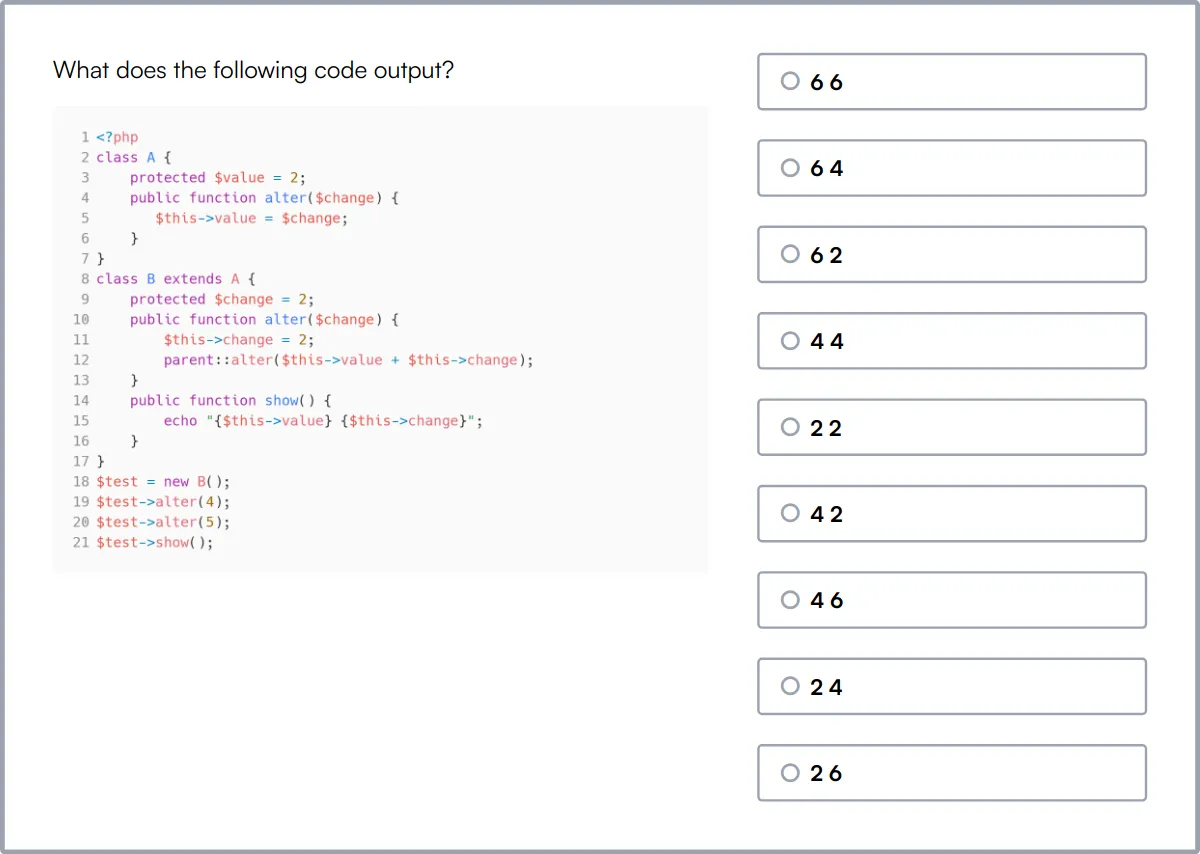
Asp.Net MVC Online Test
Our Asp.Net MVC Online Test assesses candidates on their proficiency in the Microsoft .NET framework and the Asp.Net MVC architecture. This test evaluates a candidate's ability to design and develop web applications using Asp.Net MVC.
The test covers C# programming, object-oriented programming, web development, Asp.Net MVC fundamentals, routing, Razor view engine, entity framework, and debugging. It includes scenario-based MCQs and a coding question to assess practical skills.
Candidates who perform well demonstrate a solid understanding of C# syntax, MVC architecture, and the ability to write maintainable code. They are proficient in using the Razor syntax and can effectively manage data binding and entity framework tasks.
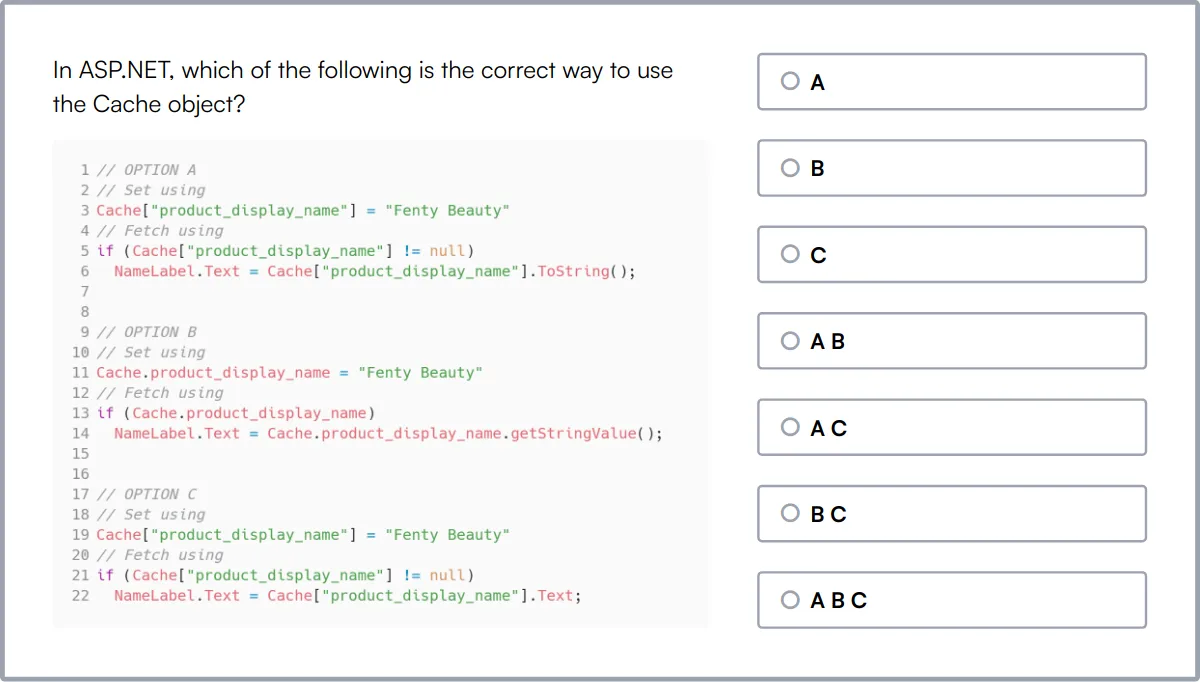
MySQL Online Test
Our MySQL Online Test evaluates candidates on their proficiency in using MySQL, including SQL queries, database design, and data manipulation. This test is designed to assess a candidate's ability to manage and manipulate data using MySQL.
The test covers SQL queries, database design, normalization, indexing, transactions, and stored procedures. It includes scenario-based MCQs to evaluate practical knowledge and problem-solving skills.
High-scoring candidates demonstrate a strong understanding of database normalization, indexing, and the ability to write complex SQL queries. They can efficiently manage transactions and use stored procedures to optimize database performance.

REST API Test
Our REST API Test evaluates a candidate's understanding of RESTful APIs and their ability to create, interact, and test them. This test assesses knowledge of REST principles and best practices.
The test covers REST API basics, HTTP methods, status codes, authentication, serialization formats, and best practices. It includes multiple-choice questions and a coding question to evaluate practical skills.
Successful candidates demonstrate a strong understanding of designing backend services, API integrations, and best practices for RESTful APIs. They can effectively handle API design and implementation tasks.
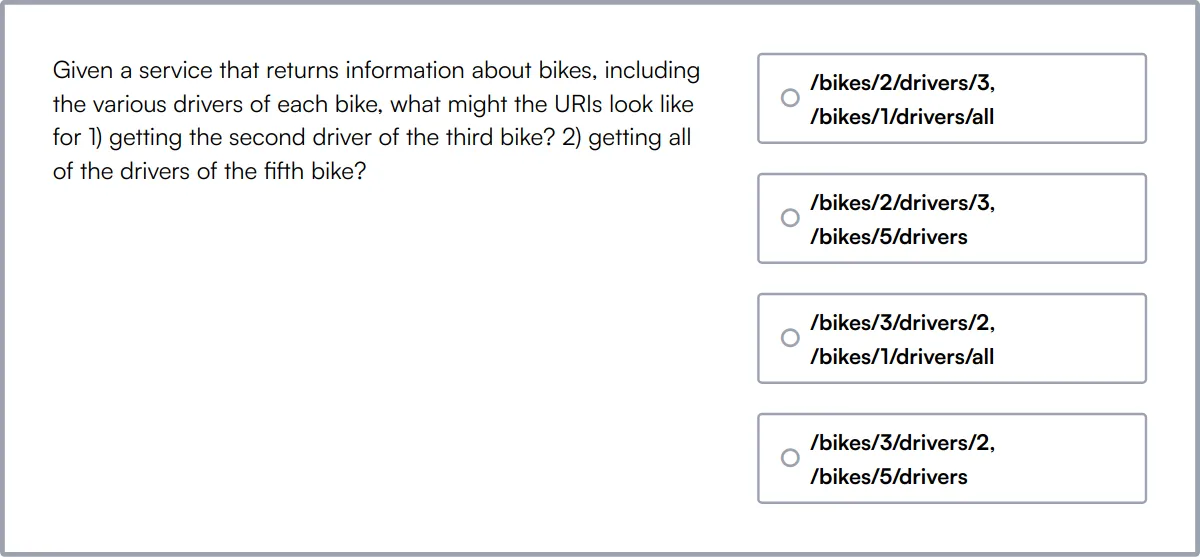
Manual Testing Online Test
Our Manual Testing Online Test evaluates candidates on their knowledge of manual software testing. This test assesses a candidate's ability to design and execute test cases to identify defects in software products.
The test covers testing fundamentals, test case writing, test plan development, test strategy, test management, and documentation skills. It includes scenario-based MCQs to evaluate practical knowledge and problem-solving skills.
Candidates who perform well demonstrate proficiency in various testing types, including mobile app testing and penetration testing. They can effectively create and manage bug reports and follow testing methodologies such as black box and white box testing.
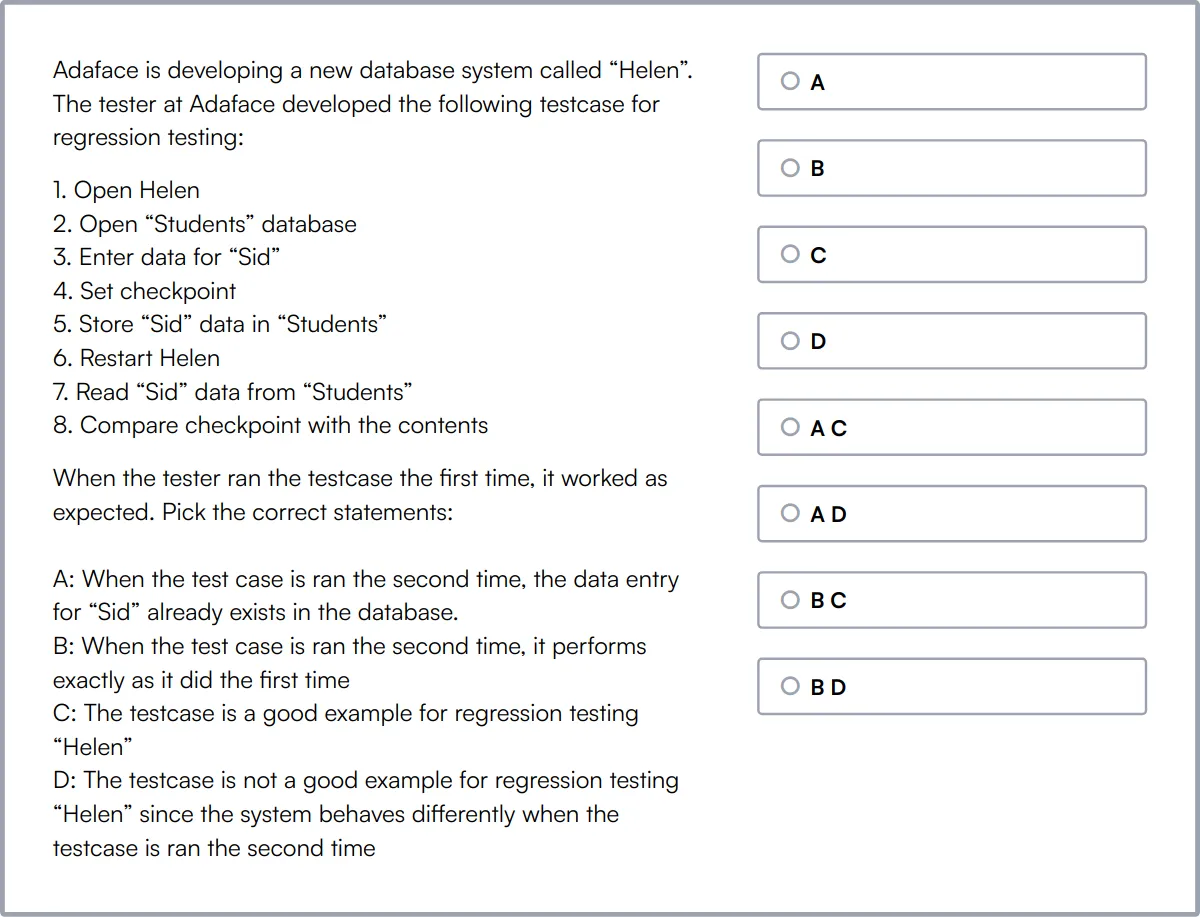
Summary: The 9 key Laravel Developer skills and how to test for them
| Laravel Developer skill | How to assess them |
|---|---|
| 1. PHP Proficiency | Evaluate the developer's ability to write clean, effective PHP code. |
| 2. MVC Architecture | Assess understanding and implementation of the Model-View-Controller pattern. |
| 3. Database Management | Check the developer's skills in designing and managing databases. |
| 4. RESTful APIs | Review ability to create and integrate well-designed RESTful services. |
| 5. Blade Templating | Examine proficiency in using Blade for efficient PHP templating. |
| 6. Routing | Test knowledge of setting up and managing web routes. |
| 7. Authentication & Authorization | Verify implementation of secure authentication and authorization systems. |
| 8. Testing | Assess ability to write comprehensive tests for application reliability. |
| 9. Composer | Evaluate use of Composer for managing PHP dependencies. |
Laravel Online Test
Laravel Developer skills FAQs
What are the key PHP skills a Laravel developer should have?
A Laravel developer should be proficient in PHP, understanding both basic and advanced concepts such as OOP, namespaces, traits, and error handling. Familiarity with PHP 7 and PHP 8 features is also beneficial.
How important is understanding MVC architecture for a Laravel developer?
Understanding MVC (Model-View-Controller) architecture is critical for Laravel developers as it is the fundamental design principle behind Laravel. This knowledge helps in organizing code efficiently and maintaining clean separation of concerns.
What should a Laravel developer know about RESTful APIs?
Laravel developers should know how to create and consume RESTful APIs, which involves understanding HTTP methods, status codes, and how to use Laravel's routing to handle API requests.
Can you explain the role of Composer in Laravel development?
Composer is a dependency manager for PHP, crucial for Laravel development. It manages library dependencies, handles package installations and updates, and ensures that the project has all the necessary components.
What is Blade templating, and why is it important for Laravel developers?
Blade is Laravel's templating engine, allowing developers to use pre-defined templates to write cleaner, more readable code. It supports data handling and layout inheritance, which simplifies the development process.
How does Laravel handle routing?
Laravel handles routing by allowing developers to define routes in web.php files. Routes can be linked to controller actions or closure functions, supporting both GET and POST requests and providing a way to pass parameters.
What are some security best practices for Laravel developers?
Laravel developers should implement CSRF protection, use prepared SQL statements to prevent SQL injection, and ensure proper authentication and authorization checks. Regular security updates and using HTTPS are also recommended.
Why is knowledge of version control important for Laravel developers?
Version control systems like Git help Laravel developers manage changes to the project codebase, collaborate with others, and maintain a history of changes. This is important for tracking issues and managing project versions.

40 min skill tests.
No trick questions.
Accurate shortlisting.
We make it easy for you to find the best candidates in your pipeline with a 40 min skills test.
Try for freeRelated posts
Free resources



